It’s a solitary existence. Packing up your things, jumping in the truck and travelling towards your next assignment requires discipline. Without a team to encourage or provide direction, self motivation is key, in boxing or in life.
You reap what you sew, which is something that’s always motivated proud Minnesotan Rob Brant (25-1, 17 KO’s), whether punishing himself in the gym or travelling to empty housing units to install sets of blinds. Despite becoming middleweight world champion last October, it’s the day job that keeps him grounded.
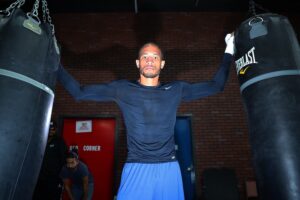
“I typically install in empty houses and I’m not very boastful, so I don’t really tell people what I do” explained Brant, from the unfamiliar surroundings of Tokyo, “Of course, I get noticed here and there and people at the warehouse know [about boxing]. They always ask about the next fight and I get really positive feedback from everyone around. But for the most part, I load up my truck and go to new housing developments.”
“It’s not a money thing for me. For me, it’s always been about understanding the value of a dollar. I might be successful in what I’m doing right now, but that’s not gonna last forever. So if I go and install blinds for a month or so, it’s a quick reminder when you get that paycheck of how hard you have to work for that and how fortunate I am. This is the value of a dollar and this is what you work for.”
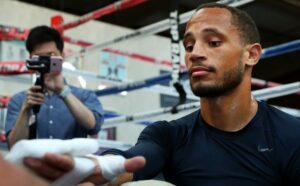
Growing up in St Pauls, Minnesota wasn’t that cliché story of the streets and survival for twenty-eight year old Brant. In fact, sport had been a constant, whether dabbling in American Football, track and field or basketball – which he admits he was awful at. Focusing on his studies and maturing in a solid household, he turned to boxing by chance, when attempting to follow his father’s footsteps.
Mr Brant Sr. had been a promising athlete himself, before balancing various jobs to make-ends-meet. His son, dubbed ‘Bravo’ oozed pride when discussing the work ethic instilled in him by his father, who had recently retired. As he prepares to face Ryota Murata in Tokyo this Friday, he spoke with passion and an eloquence not often heard from fighting men.
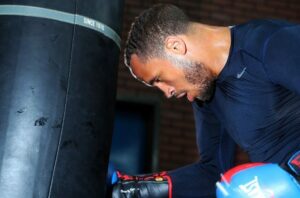
“My father played American Football and he played collegiately for a college called UCLA, so I always figured that would be my goal or my ‘thing’. I always had a deep interest in boxing and I loved boxing, but I didn’t have any family members who were involved in it, though. I was in football practice at the time, and we had a quarterback whose dad was a boxer. They had these big, twenty-two ounce gloves and they had two sets of em’. We would go out as a team and box each other in the garage. I really enjoyed doing that, I had a lot of fun doing it. Then I started boxing with his dad and he introduced me to a boxing gym Minnesota.”
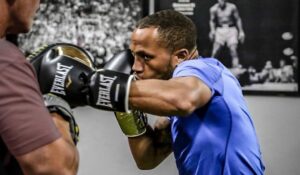
Of the hundreds of young men and women passing through the White Bear Lake gym in Minnesota, Brant was presented with an opportunity. It’s a testament to his character, the success he has since enjoyed, but as an adolescent, often the easier option is to drift away from the pressures of punching.
Competition was something he’d always enjoyed though, and interestingly he revealed there wasn’t even a moment where he’d considered hanging them up during his introduction to the sport. Although he mentioned jovially that ‘getting cracked’ during his first few weeks had made him consider whether golf would be as interesting, he was a fighter, even then.
Rob had decided that boxing was for him when he was taken for a tour of the gym by his first trainer, then eighty-six year old Emmett Yanez. There could be no turning back and now, defending his world title in Japan after facing a former champion in Germany during season one of the World Boxing Super Series, it was hard to argue with his decision.
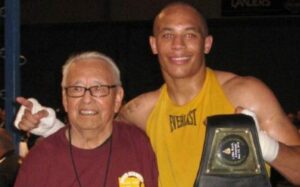
Reigning WBA middleweight champion, Brant told me of Yanez’ inspiring opening gambit, “I came in, he [Coach Yanez] showed me all of these filing cabinets, probably a dozen of them. He started opening up drawers and they were all filled with papers. He said, ‘You have a couple of options. You can come in every day and be like those [half-a-dozen] guys hitting the mitts…’ then he pointed at the filing cabinets and said, ‘Or you can be like one of these guys’. That was essentially all the people who had come in, filled out their amateur paperwork and then walked out. That was a really powerful moment for me. I’m the kind of guy that likes to walk towards challenges and from then, I was the first person in, last person out of the gym.”
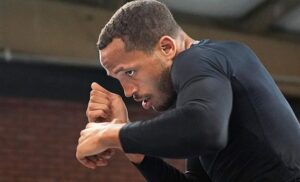
As an amateur, he’d assembled a very respectable record, accompanied by a cluttered trophy cabinet, winning various Golden Gloves and National titles within his first two years of competing. Since being described as a ‘natural’ on multiple occasions, the proud family man represented Team USA, though never fought in an Olympic squad, before making the decision to turn professional in 2012. It was in making that transition to the paid ranks that Brant truly found his feet, knocking out three of his first four opponents.
After years of climbing the ladder, headlining smaller shows and becoming the subject of whispers that would echo around boxing forums, he was given his big opportunity. Not in the weight class he had been campaigning. In fact, not even on his own continent. But in 2017, when the WBSS came calling, Brant felt invincible and accepted a position in their tournament, facing off against former light-heavyweight world champion, Jürgen Braehmer, now competing at super-middleweight. It was an exciting format that captivated fans globally and he’d been handed a reputable opponent, but it all proved too much, too soon.
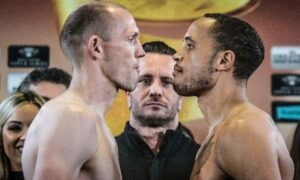
“I was the mandatory between N’Dam and Murata before I entered the WBSS and they obviously had a very controversial decision. They were ordered to rematch and it wasn’t something I wanted to wait for. I was very confident I could beat anybody in the world at that point – in any weight class.
“I went to Germany and fought Jürgen Braehmer and there’s no excuses. He was very crafty. He understood distance very well and I wasn’t properly prepared for what he brought. He beat me on the scorecards and he’s a great boxer. It was from that point that I felt like I learnt a lot. I switched up my diet a lot, took training a lot more seriously and I had the realisation that if you do not do everything you have to do, then you can lose. It took an awful lot, mentally, to come back from something like that.”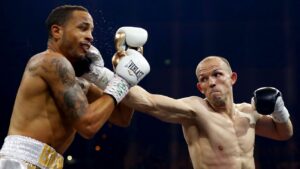
Despite suffering defeat at the hands of the crafty German, the fight catapulted Brant’s career at home, in the United States. Once he’d taken the time to regroup, he returned, demolishing an overmatched Colby Courter only five months later. Facing Courter had given him the chance to focus on his preparation, taking that vital learning from his jaunt to Europe and ensuring that no stone was left unturned.
Just shy of a year since his sole defeat, ‘Bravo’ would square off against Japanese champion and former Olympic gold medalist, Ryota Murata. The Teiken Promotions fighter had reclaimed his title from Hassan N’Dam, showing resilience and stopping the durable Cameroonian in the seventh round. Brant knew that this time, everything had to be perfect. It was his moment.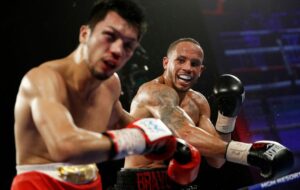
“Facing Murata, I needed to be at my best. It wasn’t a matter of trying hard – I had to do it. I wasn’t in a position to continue taking high-profile losses, so this was kind of it for me. From that point forward, I trained very hard, which probably explains the punch count. I put my heart and soul into the ring that night and that’s where the victory came from. It honestly didn’t settle in. It just felt like I won a fight, which is the best feeling in the world. I’ve always said if you could bottle the feeling of winning in a boxing ring, then everyone would be an addict.
“So, it took me a while until I was on vacation with my wife and I was sitting on vacation, thinking about how from the first moment I saw Murata, I was telling myself I could beat him. The realisation hit me that there’s somebody out there, sitting on the couch, who was looking at that fight saying, ‘I am gonna beat Brant one day’. From that point, I ran every day of my vacation and stayed active, working out. As amazing as it is, there’s a feeling that it’s not over. It’s great to have a belt, but I don’t feel like I have truly accomplished being a world champion until you are THE world champion. It’s not until you have all of those belts and you’re undisputed, then you can sit back and say, ‘I’m the champ’. Right now, I’m a piece of the puzzle.”
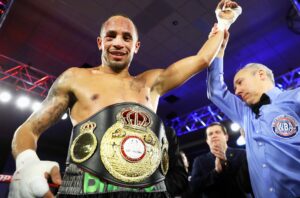
Their second meeting, only days away, could prove to be the toughest of the Minnesotan’s seven-year professional career. Murata has less mileage, is fighting at home and possesses elite amateur pedigree. But it’s been done before. Rob told me he thought that his rival would start fast with the support of the Japanese fans only yards behind him. He reckons the thirty-three year old will ‘jump on him from the first bell’, but ensured me he was ready for every eventuality. He planned on breaking Murata, mentally, on his own soil.
An impressive beating of Khasan Baysangurov sandwiched the Murata bouts on Brant’s record, where he stopped the unbeaten Eastern challenger in the eleventh round. Again winning plaudits, the brutal nature of the finish showed a different side of the WBA world champion. He could move his feet, evade punches and counter expertly, but his aggressive work on the front foot proved too much for the Russian. Brant was a cocktail of boxing fundamentals – fit for serving to the wider audience. Working with Top Rank, his exposure via ESPN had helped boost his profile, but with far bigger tests ahead, he was focused purely on the task at hand.
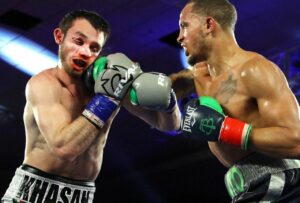
“I feel like it’s appropriate [to give Murata the rematch]. He came to the United States to give me a chance at the title. I was victorious and I felt it was right. There was obviously financial gain in coming to Japan, but it was more than that. This was a champion who gave me a chance, which is rare in this sport. I feel like I should allow him to be the challenger in his home country, just as I was in mine.”
“I know the big fights will be there. Those are the fights that I want, but I know they don’t happen unless you beat the person in front of you. I dedicate myself to an assignment and the rematch with Murata, I don’t think about the bigger picture. You are quickly forgotten in this sport once you lose. I want to beat every person put in front of me. Every fight I have is the biggest fight of me life because it can all disappear in the blink of an eye. I’m locked into Murata.”
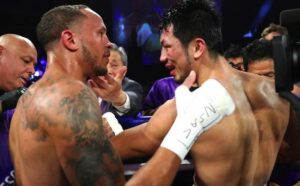
As he continues to adjust to the fourteen hour time difference in Tokyo, relaxing after a morning of training, Rob Brant thinks back on an exciting career thus far. He’s sharing the Teiken gym with his opponent, on strict schedules to avoid any clashes, but he remains cool at all costs. He remains focused. It’s a long way from St Pauls and the trips to his warehouse, loading up the blinds, but he’ll be back shortly, reporting for duty.
Emmett Yanez sadly passed away three years ago, too soon to watch his prodigy hoist their world title aloft. The filing cabinet he showed Brant that first day at White Bear Lake was the foundation for a successful career. It was an all-too visual reminder of those that slip through the net. Brant was different, though. He’s only just getting started.
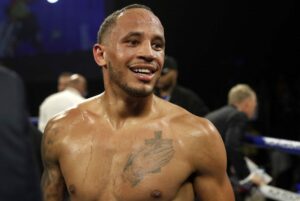
“Honestly, I would really like to be remembered as a person who gave it everything, every time he was in the ring. It’s how I live. I live with boxing and it’s everything I’ve ever wanted. I want to be remembered for that. If you hit em’, he’s gonna hit you back and he was a true, true fighter.”
Interview written by: Craig Scott
Follow Craig on Twitter at: @craigscott209